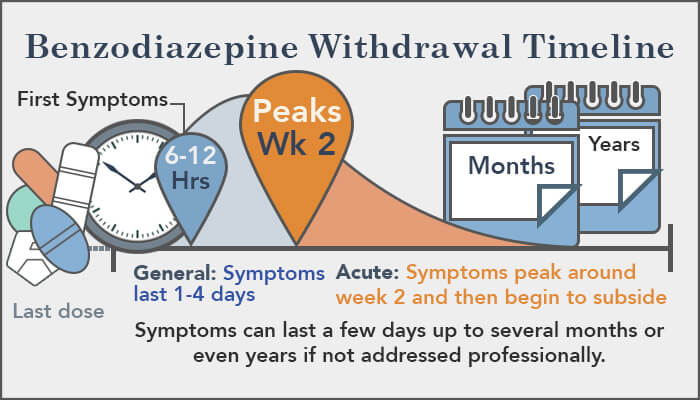Benzodiazepines are widely prescribed medications that are used to treat various medical conditions, such as anxiety, seizure disorders, and insomnia. But as with any medication, there are potential risks associated with benzodiazepines — including the possibility of serious withdrawal symptoms. Questions about the potential fatal effects of benzodiazepine withdrawal have been raised in recent years, prompting an important conversation about these medications and their effects.
In this article, we’ll explore the potential risks associated with benzodiazepine withdrawal, and whether or not it is possible for these symptoms to be fatal. We’ll also look at how to recognize and manage the symptoms of benzodiazepine withdrawal, so that you can make informed decisions about your own treatment.

Contents
- Is Benzodiazepine Withdrawal Fatal?
- Frequently Asked Questions about Benzodiazepine Withdrawal
- Can Benzodiazepine Withdrawal Be Fatal?
- What Are the Symptoms of Benzodiazepine Withdrawal?
- How Long Does Benzodiazepine Withdrawal Last?
- What Is the Best Way to Treat Benzodiazepine Withdrawal?
- What Can I Do To Reduce the Risk of Benzodiazepine Withdrawal?
- Benzo Withdrawal Timeline: How Long Cravings Last
Is Benzodiazepine Withdrawal Fatal?
Benzodiazepines are a type of commonly prescribed medication that has been used to treat anxiety, insomnia, and other conditions. While they are generally considered safe and effective, they can also cause serious side effects and lead to addiction and withdrawal. The question of whether benzodiazepine withdrawal can be fatal has been the subject of much debate.
What Are Benzodiazepines?
Benzodiazepines are a class of drugs typically prescribed to treat anxiety, insomnia, and muscle spasms. They work by acting on the brain’s GABA receptors, which are responsible for regulating the body’s stress response. Commonly prescribed benzodiazepines include diazepam (Valium), alprazolam (Xanax), lorazepam (Ativan), and clonazepam (Klonopin).
Benzodiazepines are generally considered safe and effective, but they can cause serious side effects. Common side effects include drowsiness, dizziness, confusion, and impaired coordination. Long-term use can also lead to physical and psychological dependence, as well as addiction.
Can Benzodiazepine Withdrawal Be Fatal?
Withdrawal from benzodiazepines can be uncomfortable and even dangerous in some cases. Symptoms of benzodiazepine withdrawal can include anxiety, insomnia, tremors, sweating, and seizures. In extreme cases, withdrawal can lead to delirium, hallucinations, and even death.
However, it is important to note that the risk of death from benzodiazepine withdrawal is extremely rare. In most cases, benzodiazepine withdrawal can be safely managed with the help of a healthcare professional. Detoxification should be done gradually, under medical supervision, to reduce the risk of serious complications.
In addition to medical detox, doctors may also recommend lifestyle changes and therapy for those trying to overcome benzodiazepine addiction. This may include cognitive behavioral therapy, which can help individuals identify and change unhealthy thought and behavior patterns. Support groups can also be helpful for those struggling with benzodiazepine withdrawal.
Frequently Asked Questions about Benzodiazepine Withdrawal
Benzodiazepines, such as Valium and Xanax, are prescribed for managing anxiety and other mental health conditions. Withdrawal from these medications can be difficult and even fatal when done without medical supervision.
Can Benzodiazepine Withdrawal Be Fatal?
Yes, benzodiazepine withdrawal can be fatal. In extreme cases, withdrawal can cause seizures or delirium tremens, which can lead to death. Because of the serious risks associated with withdrawal, it is important to work with a doctor to slowly reduce your dosage in a safe and monitored environment.
What Are the Symptoms of Benzodiazepine Withdrawal?
The symptoms of benzodiazepine withdrawal vary depending on the person and how long they have been taking the medication. Common symptoms include anxiety, insomnia, headaches, irritability, tremors, and paranoia. More serious symptoms can include seizures, psychosis, and hallucinations.
How Long Does Benzodiazepine Withdrawal Last?
The duration of benzodiazepine withdrawal depends on several factors, including the person’s medical history and the dosage of the medication. The withdrawal process can last from weeks to months. It is important to be monitored by a doctor during this time as withdrawal can cause serious health risks.
What Is the Best Way to Treat Benzodiazepine Withdrawal?
The best way to treat benzodiazepine withdrawal is in a medically supervised environment. This is because withdrawal can be unpredictable and can cause serious health risks. A doctor can work with you to slowly reduce your dosage and provide medications to ease the withdrawal symptoms.
What Can I Do To Reduce the Risk of Benzodiazepine Withdrawal?
The most important thing you can do to reduce the risk of benzodiazepine withdrawal is to talk to your doctor before reducing or stopping your dosage. Your doctor can work with you to safely reduce your dosage and provide medications to ease the withdrawal symptoms. It is also important to avoid drinking alcohol or taking recreational drugs, as this can increase the risk of serious side effects.
Benzo Withdrawal Timeline: How Long Cravings Last
In conclusion, the answer to the question ‘Is Benzodiazepine Withdrawal Fatal?’ is a complex one. While there is no guarantee of fatality, the symptoms of benzodiazepine withdrawal can be severe and potentially life-threatening. It is important to be aware of the risks associated with benzodiazepine use and to seek medical advice if you are considering ceasing your use of benzodiazepines. Withdrawal symptoms can range from mild to severe and can include anxiety, depression, insomnia, muscle tension, and seizures. The best course of action is to follow your doctor’s instructions and to seek medical help if you are experiencing any withdrawal symptoms. By taking the necessary precautions and understanding the potential risks associated with benzodiazepine withdrawal, you can help to ensure your own safety and wellbeing.
